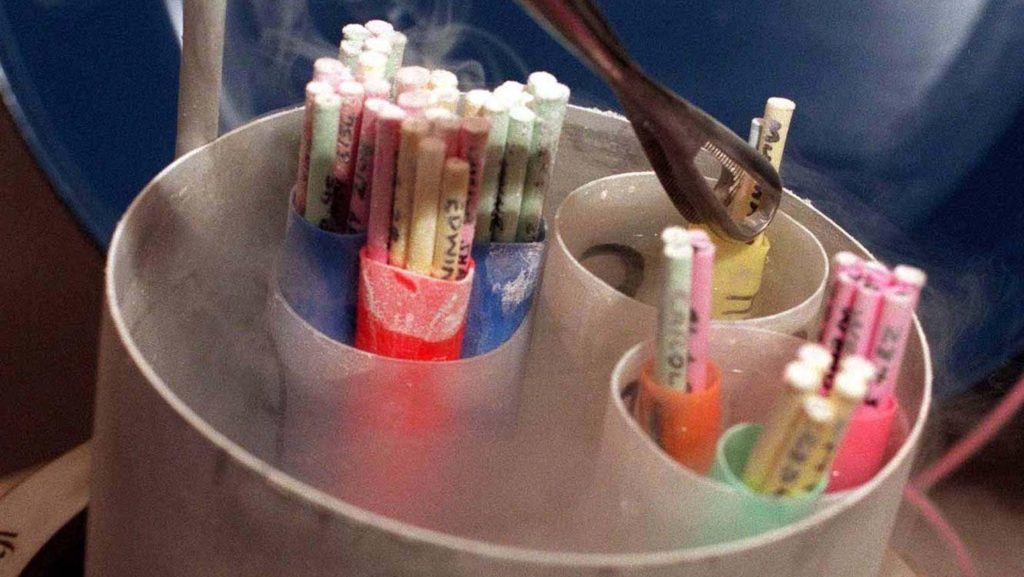As in vitro fertilization (IVF) continues to make headlines, the status of the many embryos created and frozen in this process is a key concern for Catholics. OSV News' Charlie Camosy recently spoke with Kent J. Lasnoski, founding president of the San Damiano College for the Trades, who co-edited "Human Embryo Adoption, vol. 2, Catholic Arguments For and Against" for the National Catholic Bioethics Center.
Charlie Camosy: Can you give us a brief history of the Catholic debate over embryo adoption?
Kent J. Lasnoski: 1978 saw the first birth of a child conceived "in vitro," and surprisingly the Catholic magisterium wrote definitively in less than 10 years on the subject in its 1987 landmark document "Donum Vitae," which treated a host of topics in reproductive technology and therapies.
At that point, the specter of what to do with "spare" embryos had not raised its head. Consciousness of the problem of "spare" embryos grew over the next decade, so much so that by 1996, St. John Paul II stated in a speech to doctors that there seemed to be no licit solution for their plight and that all IVF must be stopped immediately.
Popular Catholic interest was piqued in the same year when Cardinal Hume responded to a group of women attempting to adopt embryos from a UK clinic that was disposing of more than 3,000. The cardinal opined that it was better to dispose of the embryos in a dignified manner.
Secular medical ethics journals, then Catholic medical ethics journals and the Pontifical Academy of Life began taking up the question in the next decade in ways that seemed more open toward embryo adoption. By 2008, both sides of the Catholic debate were well staked out in two separate volumes on the topic.
That same year marked another watershed moment with the release of the church document "Dignitas Personae," which states that embryo adoption seems to suffer from the same problems as other forms of surrogacy, even if adoptive parents intend to raise the children themselves.
Since 2008, Catholic moral theologians have continued debating the liceity of embryo adoption since "Dignitas Personae" does not provide a definitive statement on embryo adoption's intrinsic immorality, and the church has not further clarified her position.
Faithful Catholic moral theologians have continued to argue from the perspective of extraordinary vs. ordinary means of preserving life, natural law, Catholic social teaching, theology of the body, Scripture and historical precedent for and against embryo adoption, ultimately culminating in this new volume on the topic aimed at helping all Catholics understand the issue and its stakes, as well as providing material for the magisterial consideration of the church.
Camosy: Especially in light of this book you co-edited and contributed to, how would you summarize the current state of the debate?
Lasnoski: The debate is limited to a small group of Catholic lay faithful and moral theologians because the majority of Catholics, who diverge from the church on other matters of sexual and medical ethics, are not likely to find embryo adoption particularly controversial.
Among those embroiled in the debate, thankfully, both strong opinion and charity abound. The fulcrum of the whole debate sits on answering this question: Is it intrinsically evil to take a living human embryo and move it into a woman's uterus (including the uterus of the genetic mother), thereby using unnatural means to set the conditions for that woman to become pregnant?
If we take a hard line on this, then even the genetic mother of the frozen embryos cannot implant them within her own uterus. Regardless of what we call the action: "rescue," "adoption," "liberating a captive," "sheltering the homeless," or simply "becoming pregnant by means other than sexual intimacy," the physical movement of the embryo is required. If the church determines that to be always wrong, then none of the circumstantial goods and evils or the questions of intention matter.
Camosy: Can you summarize your own views?
Lasnoski: For my part I am torn. I have now published openly on both sides of this argument: First in favor by looking at the issue from the standpoint of the works of mercy and the historical paradigm of the Mercederian and Trinitarian orders who gave themselves as ransom for enslaved Christians; and now against (because we needed an author for the chapter) by suggesting that embryo adoption unfortunately misunderstands the spousal meaning of self-gift in the context of the theology of the body.
I would like embryo adoption to be a licit solution for the crisis of enslaved, frozen embryos, who deserve every chance at life in Christ, but I am not certain that it is licit.
Camosy: More and more of us are encountering very serious Catholics who have adopted embryos and are currently raising them as older children. In your view, how should the church think about this?
Lasnoski: In choosing to avoid declaring definitively on this issue, the church has a responsibility for creating that situation. None of those heroically generous parents should be condemned or rebuked by the church or anyone.
The church should listen to the radical generosity of these spouses who saw the heinous injustice of embryo freezing and felt the call of God to do something about it, to witness to the pro-life teaching of the church to love and support the poorest of the poor. Let's face it, who is poorer and more neglected, more marginalized than a person dehydrated, frozen and held hostage for a monthly fee?
Ultimately, the church needs to make a definitive teaching on this matter so Catholics can, in good faith, energetically pursue whatever the best course of action is for these abandoned humans.

